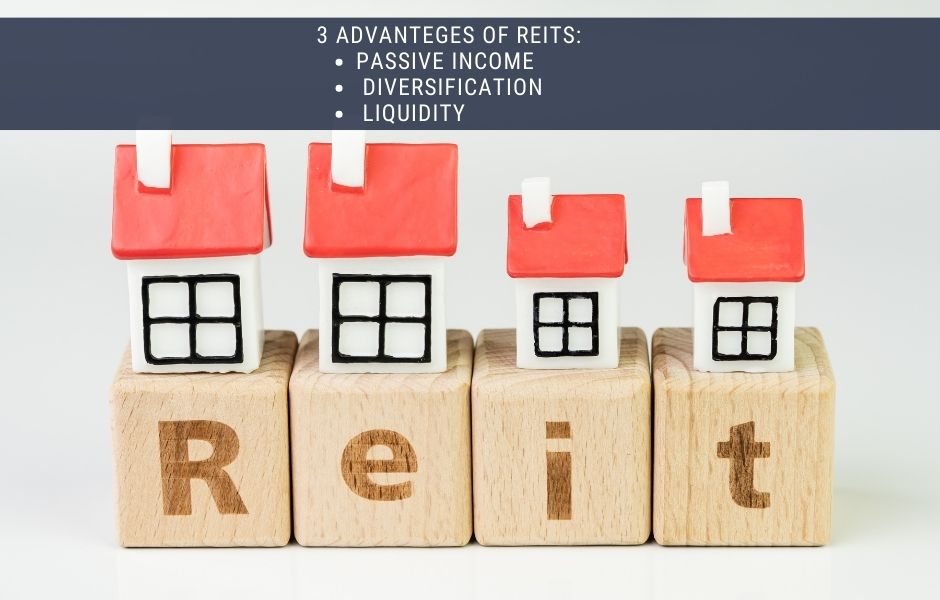Investments That Pay Passive Income | Real Estate Investments Trusts (REITs)
Real estate investment trusts (REITs) have been a stalwart of passive income investors since 1960. In this article you’ll learn what these unique stocks are, why investors use them, and see my top picks for 2023

David Garner
Real Estate Investment Trusts (REITs)
Real estate investment trusts (REITs) are businesses that own, operate, or finance income-generating real estate. These stocks allow investors to participate in real estate without having to own or manage the properties themselves. They are distinguished by the fact that they are obligated by law to pay the bulk of their taxable revenue to shareholders in the form of dividends, making them an appealing investment choice for individuals seeking passive income.
Pro Tip: Get Details of Brand New Passive Income Investments Delivered to Your Inbox Every Thursday

What Exactly is a REIT?
To qualify as a REIT, a company must meet certain criteria established by the Internal Revenue Service (IRS). The requirements include:
1. The company must maintain at least 75% of it’s assets in real estate, real estate debt, cash, or U.S. Treasuries.
2. The company’s income must comprise at least 75% from real estate-related sources
including rent, interest on mortgages, or sales of real estate.
3. REITs must distribute at least 90% of their taxable income to shareholders in the form of dividends.
4. In terms of ownership, to qualify as a REIT, a company must have at least 100 shareholders, and no more than 50% of its shares can be owned by 5 or less individual shareholders.
3 Advantages of Investing in REIT Stocks
REITs provide investors with various advantages, including passive income, diversity, and liquidity. Here are a few important advantages:
1. Passive Income: As previously stated, REITs must disperse the bulk of their taxable income to shareholders. This implies that investors might earn monthly dividend payments without actively managing the assets.
2. Diversification: Real estate investment trusts (REITs) invest in a wide range of properties, including office buildings, residential complexes, and retail malls. This diversification can assist lower risk for investors, since it distributes their investment over numerous properties and marketplaces.
3. Liquidity: Because REITs are openly listed on stock exchanges, they are simple to purchase and sell. This makes them a more liquid investment choice than tangible real estate, which might be difficult to sell.

Are REITs a Good Investment?
In the long term, REITs have outperformed the S&P 500 Index.
According to a study undertaken by the National Association of Real Estate Investment Trusts (NAREIT), REITs had an average yearly total return of 9.7% between 1972 and 2020, compared to 7.7% for the S&P 500.
Here are five REIT stocks to consider for your portfolio in 2023:
1. Prologis (PLD): Prologis is the largest industrial REIT in the world, with a portfolio of over 1 billion square feet of logistics and distribution facilities. The company has a quarterly dividend distribution policy and its current dividend yield is around 2.1%.
2. American Tower Corporation (AMT): American Tower is a REIT that owns and operates cell towers and other wireless communication infrastructure. The company has a quarterly dividend distribution policy and its current dividend yield is around 1.7%.
3. Digital Realty Trust (DLR): Digital Realty is a REIT that specializes in data centers and other digital infrastructure. The company has a quarterly dividend distribution policy and its current dividend yield is around 3.4%.
4. Public Storage (PSA): Public Storage is the largest self-storage REIT in the world, with over 2,500 facilities across the United States and Europe. The company has a quarterly dividend distribution policy and its current dividend yield is around 3.3%.
5. Alexandria Real Estate Equities (ARE): Alexandria Real Estate Equities is a REIT that focuses on life science and technology properties. The company has a quarterly dividend distribution policy and its current dividend yield is around 2.6%.

Conclusion
Finally, REITs allow investors to participate in real estate without the inconvenience of managing properties themselves. They provide several advantages, including passive income, diversification, and liquidity. Moreover, in the long run, REITs have outperformed the larger stock market, making them an appealing investment alternative for investors seeking long-term growth and income.
Changes in interest rates, economic conditions, and property market movements can all have an influence on REITs. Before investing in any REIT stock, do your homework, including analyzing the company’s portfolio of properties, management team, and financials.
Another thing to think about while investing in REITs is the tax ramifications. REIT payouts are taxed differently than regular stock dividends, and investors may face federal and state taxes. To understand the tax consequences of investing in REITs, speak with a financial advisor or tax specialist.
In conclusion, REITs may be a significant addition to a well-diversified investment portfolio since they provide investors with a unique chance to engage in real estate while earning passive income. Yet, with the proper study and due diligence, investors may select high-quality REIT companies with long-term growth and income potential.
DISCLAIMER: The stock suggestions in this article are provided solely for informational reasons and should not be construed as financial advice. Before making any investing decisions, conduct your own research and speak with a financial professional.

References:
National Association of Real Estate Investment Trusts. (2021). REITs in the Economy.
Internal Revenue Service. (2021). Real Estate Investment Trusts (REITs).


